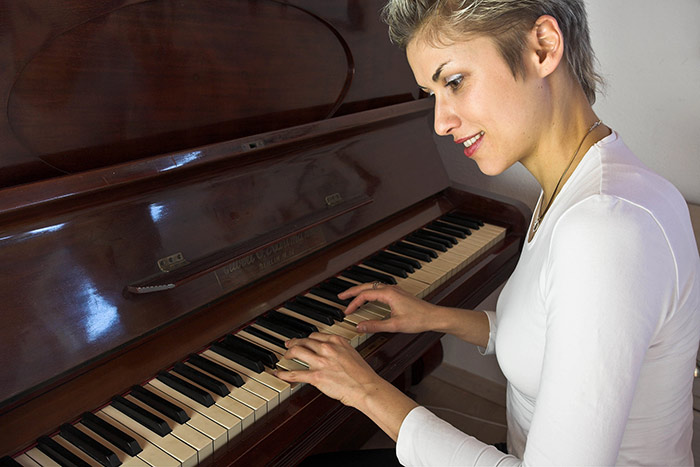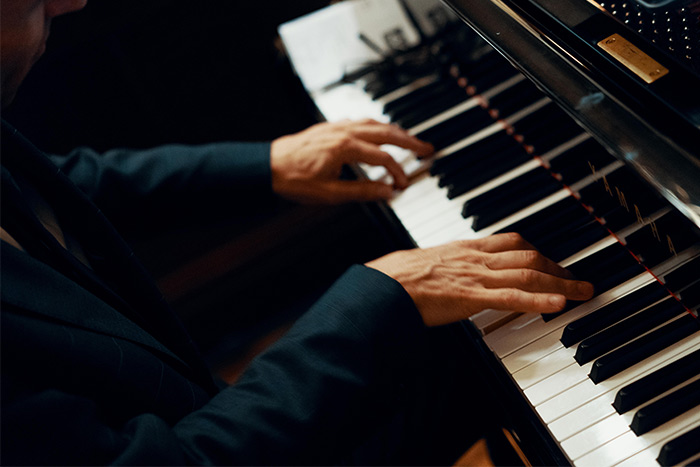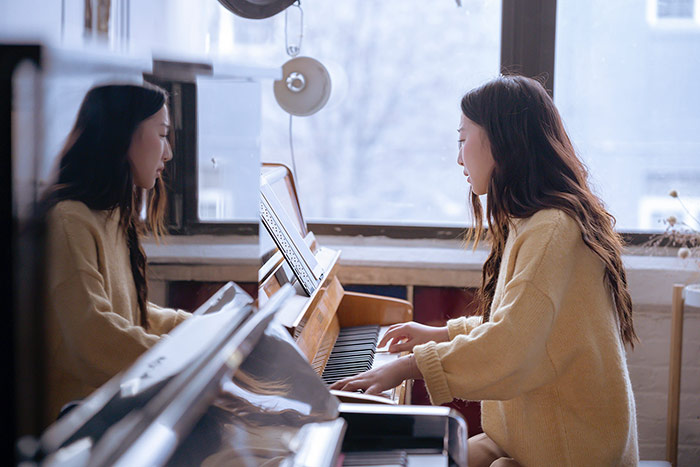Practise. Do it regularly, preferably every day, and you can be great. You already know this.
What you might not know is that the quality of your practise is far more important than the amount of practise. It’s proven by medical and educational research that if you get it right, you learn much faster.
So, how to practise the piano properly? Here are some tips to help you make the most out of your practiae and improve your piano playing.

1. Set a Specific Goal for Every Session
Decide what you want to achieve and make it something you can measure. By focusing on the outcome you get there quicker and it’s far more satisfying. If you want to improve a technical or physical ability like finger span or speed, then aim to nail down five specific arpeggios and scales. Courses make it far easier to identify specific, measurable goals.
Alternatively, if you’re dying to crack a tough section, your goal might be to play it through ten times without mistakes. Make sure you play in and out of the section, so when you put the piece together it flows properly and see tip 10 for what to do when you get it right.
2. Remove Distractions
Distractions come from everywhere. It’s unavoidable, but you can do something about it. Ask family or friends not to speak to you for the next half hour. If you can only practise in the lounge, then make sure you practise when you’re alone and even if you can’t hear the TV, turn it off. You may think that the moving images aren’t distracting, but they attract enough attention from your subconscious to reduce the quality of your practise.
The worst culprit is your phone. A notification distracts you for a moment and before you know it you’re reading an article on painting garden furniture. You don’t even have a garden. Put your phone out of sight, on silent. Even better, leave it in another room. It will fight the automatic reaction we all have to take it out whenever the mind wanders.
The power of unbroken practise isn’t just that you get more done. It maximises the chances of getting into a groove, falling into a “flow” state where you are totally immersed in what you are doing. The psychological benefits of this state while practising are incredible, but the best part is that you improve a lot faster.

3. Structure practise like a workout
You wouldn’t put on your running shoes and immediately start sprinting, or walk into a gym and pick up the heaviest weights. Piano is no different. Not only does it drastically improve brain function, it’s also a physical workout for the 34 muscles and 123 ligaments used to move the fingers in each hand. You need to treat practise with the same mindset.
Loosen up your wrists and warm up your fingers with stretches and hand exercises. Then warm up your coordination with scales, improvising or whatever works best for you. Only start tricky new concepts or fixing problem sections when you’re warm and ready.
Then, just like a workout, don’t go for too long. Even world-famous concert pianists split up their practising regimes, so stop when you’ve achieved your goal before practise quality starts to suffer. Finish with a warm-down, improvising or playing something you’ve already mastered so you walk away happy and looking forward to the next session.
4. Fight Bad Habits Before they Form
Nobody gets it right the first time, but it’s still annoying when we come across a difficult part. Resist the urge to move onto the next section, fix it immediately before bad habits can form. The best (scientifically tested) method involves listening to the voice in your head warning you about a problem area and stop before you hit it. Work it out, practise it, and only move on when you get it right.
The same goes for fixing bad technical habits like posture and fingering. It might take a little time to get these right at the start, but it is far easier and quicker than fixing bad habits at a later stage. In bad cases, the only cure is to start again from scratch.
Remember practise is permanent so if you practise with bad habits and without good education sadly you will not make great progress.

5. Vary Your Practise Techniques
If you practise the same way every time your progress will slow down and piano becomes a chore. You can fight this and avoid hitting a plateau by alternating practise techniques.
This can be as simple as deciding not to play problem sections over and over. Slow them down. Speed them up. If you usually start on the easiest section, start with the hardest. If you always play with both hands, then try each hand separately.
It doesn’t matter what you change as long as you change something. Each new technique might be difficult at the start, but they keep it fresh and you will see rapid improvement.
6. Work With Your Teacher to Create a Proper Methodology of Practise
Start learning the piano with an expert and academic professor. Learn basic musical theories from him that will help you understand every piece of music you play.
Your academic professor will certainly give you techniques and exercises to strengthen your technique in playing the piano with ease and flexibility.

7. Practise with a Metronome
To adjust your musical rhythm, you must play the piano with a metronome.
This correct and repetitive rhythm creates harmony in you with the music, organises your ideas, and teaches you patience and deliberation without excessive speed or boring slowness.
Read this article to know the importance of metronome: The Importance Of Practising With A Metronome
8. Consistent Feedback
One problem faced by many students is that they practise without feedback to tell them whether they are playing correctly.
It’s hard enough when people can hear you practise in the background, but even worse if you have to ask a friend to listen intently and stop you at every mistake.
App learning does it for you. You can loop sections and the app will stop when you make a mistake. You can keep repeating it until you’ve got it down.

9. Practise Playing in Public.
Playing the piano alone without an audience will not give you the strength of character and motivation that will make you a confident and capable pianist, so participate in music evenings and festivals as much as possible and shine in your piano playing.
10. Reward Yourself
Remember that goal you set at the start? Hit it, then reward yourself.
Psychological research tells us that this “positive reinforcement” is far better for learning and developing good habits than punishing mistakes (“negative reinforcement”). So when a session isn’t going well, don’t be hard on yourself. Keep calm and carry on until you achieve your goal.
It doesn’t matter what reward you choose. An episode of your favourite show, or something as simple as a cookie. However small, it will help to form stronger neural pathways and reinforce the feeling of achievement from every small improvement.
Savour that cookie. You earned it.







